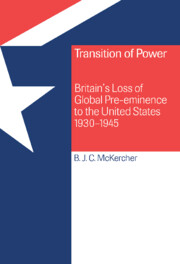Book contents
- Frontmatter
- Contents
- Acknowledgments
- List of abbreviations
- Prologue: Power and purpose in Anglo-American relations, 1919–1929
- 1 The end of Anglo-American naval rivalry, 1929–1930
- 2 The undermining of war debts and reparations, 1929–1932
- 3 Disarmament and security in Europe and the Far East, 1930–1932
- 4 The unravelling of co-operation, 1932–1933
- 5 Moving away from the United States, 1933–1934
- 6 Britain, the United States, and the global balance of power, 1934–1935
- 7 From Abyssinia to Brussels via London, Madrid, and Peking, 1935–1937
- 8 Appeasement, deterrence, and Anglo-American relations, 1938–1939
- 9 Belligerent Britain and the neutral United States, 1939–1941
- Epilogue: ‘A new order of things’, 1941–1945
- Select Bibliography
- Index
5 - Moving away from the United States, 1933–1934
Published online by Cambridge University Press: 15 July 2009
- Frontmatter
- Contents
- Acknowledgments
- List of abbreviations
- Prologue: Power and purpose in Anglo-American relations, 1919–1929
- 1 The end of Anglo-American naval rivalry, 1929–1930
- 2 The undermining of war debts and reparations, 1929–1932
- 3 Disarmament and security in Europe and the Far East, 1930–1932
- 4 The unravelling of co-operation, 1932–1933
- 5 Moving away from the United States, 1933–1934
- 6 Britain, the United States, and the global balance of power, 1934–1935
- 7 From Abyssinia to Brussels via London, Madrid, and Peking, 1935–1937
- 8 Appeasement, deterrence, and Anglo-American relations, 1938–1939
- 9 Belligerent Britain and the neutral United States, 1939–1941
- Epilogue: ‘A new order of things’, 1941–1945
- Select Bibliography
- Index
Summary
As you know, a very great part of my work has been to create good understanding between America and ourselves, and I regret most profoundly that during the last twelve months, solely owing to the action of the President, that work has been largely undone, which is a great grief to me.
MacDonald, June 1934From the British viewpoint, Roosevelt's election did not spell the end of Anglo-American co-operation. MacDonald, Chamberlain, and others looked towards an amicable resolution of war debts once general American opinion understood the distress that continued payments created for the British government. Moreover, despite concern about the World Disarmament Conference after Hitler's appointment as German chancellor, hope existed in some quarters that joint efforts by London and Washington might produce headway in arms limitation. Yet, diplomacy differs little from other human enterprise: a willingness to align cannot come from one side alone. Roosevelt refused to follow the more internationalist path taken by Hoover and Stimson. There were compelling reasons, all stemming from the domestic economic crisis that, in his election campaign, he promised to overcome: widespread bank failures menaced the country's fiscal solvency; with the dollar tied to gold, one-half of American gold reserves had drained away in 1932; a high dollar had savaged American exports; reduced demand for consumer goods at home and abroad saw industrial unemployment reach record highs, with attendant social distress; and farm prices and income had declined 40 per cent from their 1929 value. Thus, Roosevelt and his advisers, especially Rexford Tugwell and Raymond Moley, two Columbia University professors, concluded that the United States should solve its problems before tackling international issues.
- Type
- Chapter
- Information
- Transition of PowerBritain's Loss of Global Pre-eminence to the United States, 1930–1945, pp. 157 - 185Publisher: Cambridge University PressPrint publication year: 1999

